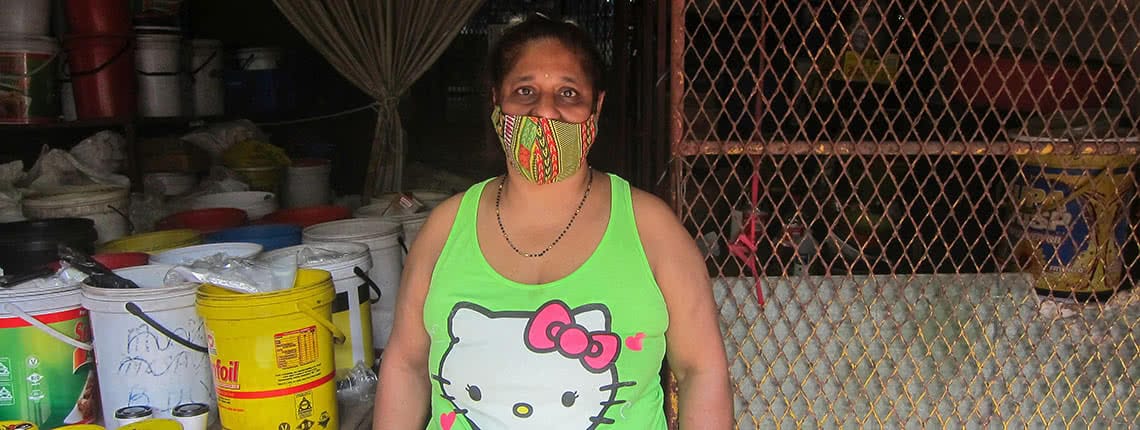Romilla Chetty—a third-generation trader in Durban’s Warwick Junction and the first woman in her family to run the business—is an advocate for the rights of market traders and street vendors. She sees her trading community as “one big family” and has served as the secretary for the Early Morning Market Traders Association for two decades.
Warwick Junction is a transport hub in the heart of Durban, where thousands of informal workers earn their livelihoods. They sell food to hungry commuters, and clothes, hats and beads.
The national lockdown that South Africa’s government announced in response to the COVID-19 pandemic, beginning March 27, 2020, brought informal trade to a sudden halt.
The South African Informal Traders Alliance (SAITA), of which the Early Morning Market Traders Association is a member, joined forces with WIEGO and other advocates to demand that informal traders be included in the Disaster Management Regulations. On April 2 the government deemed informal food traders to be essential service providers—but only if they had municipal authorization and permits. Several municipalities balked, saying they were closed. It took more concerted advocacy, with traders’ representatives leveraging the connections they have built in recent years, for the government to respond by telling municipalities to open offices and ensure traders could get the necessary permits.
“We left the market on the 27th of March, thinking that we would be back in a month’s time, but that certainly did not happen. We experienced problems for over six months with getting the market opened.”—Romilla
While it appeared that the South African government was changing its attitude towards the informal economy when they declared informal food vendors (and, later, informal recyclers) to be essential service providers, their support for the sector stopped there. Across the country, all levels of government have remained disconnected from the informal sector and the needs of informal workers. Rather than trying to assist informal workers, their responses have been punitive.
However Romilla, along with her colleagues and allies, has worked hard to get trading up and running again. After the municipality allowed only one gate to be opened into Warwick’s early morning market, Romilla made numerous appeals to the municipality to open the rest of the gates and to reinstate regular trading hours. When they did not receive a response, Romilla and her colleagues decided to prove to the municipality that adequate measures to prevent the spread of coronavirus could be upheld with all gates open. They ensured that all the traders were equipped with sanitizer and that all of the trading tables were at least 2.5 metres apart. Then they created rosters for each of the gates, designating certain traders to have the responsibility of ensuring that customers’ sanitized their hands as they entered the market.
Romilla says she intends to continue working in the Early Morning Market and hopes that the local authorities will truly recognize the value of informal workers.
“Being the brave person that I am, I have overcome my fear of the virus and have learned to live with it, because it is going to be part of our lives.”—Romilla
Photo: In 37 years of trading, Romilla has expanded the family business from two stalls to six. Credit: Sarah Heneck
